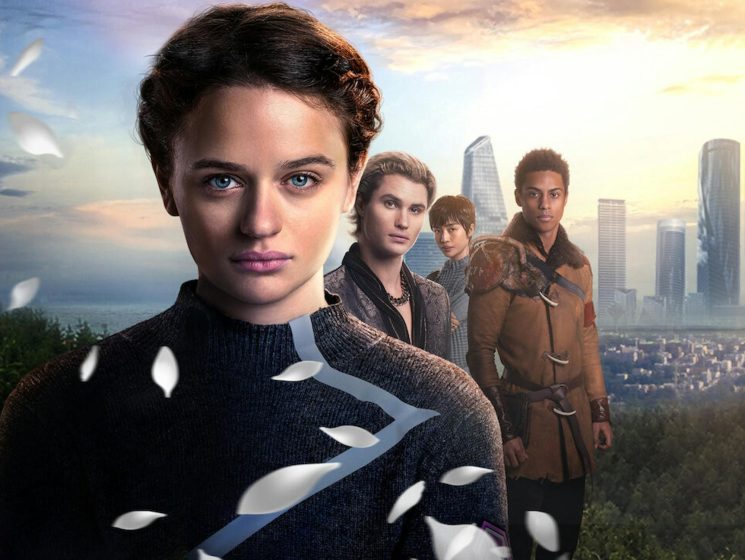
By Christine Garcia
Disclaimer: This includes spoilers from the “Uglies” movie.
On Sept. 13, Netflix promoted the release of the movie adaptation of the “Uglies” novel by Scott Westerfield. The movie has a stacked cast of characters, including Joey King, Chase Stokes, Laverne Cox and more.
The film explores a dystopian world that centers around a society that has high beauty standards. In this fictional civilization, all teenagers under the age of sixteen are forced to hide in Uglyville, to be segregated from the “Pretties” who live in New Pretty Town. While getting their formal education at Uglyville, they wait until the government approves their cosmetic surgery at sixteen years old, to be “beautiful.” Ironically, the results of the cosmetic surgery resemble putting on the “bold glamor” filter on TikTok. The filter is most known for reconfiguring a person’s face to have stronger eyebrows, chiseled cheekbones and pumper lips. Many content creators have called out the filter, for perpetuating harmful beauty standards.
Tally Youngblood, the protagonist, is fifteen years old and looking forward to beautifying her appearance. That was until she met Shay, who question the concept of being good-looking. In particular, Shay’s defiance towards the government-mandated plastic surgery grows when she finds a copy of “Walden Pond” by Henry David Thoreau. Shay learns the value of humanity after reading the novel as Thoreau documents his connection with nature while criticizing society’s excessive materialism. “Walden Pond” is a contrast to the Uglies’ world because people were born to think they’re ugly, forcing them to value nothing else but their own social life after they are reprogrammed to become pretty.
Doctor Cable, played by Cox, tells Youngblood that she will not get her reconstructive surgery to beautify her looks if she doesn’t save Shay from the rebels that go against their ideology. As a result, Youngblood joins the rebels as a double spy in hopes of saving her friend. While working as a spy, she meets David (Keith Powers), the leader of the resistance who tells her the truth about the cosmetic surgery. According to David, the surgery is very dangerous causing lesions in the brain, reducing individuality and numbing emotions. However, there is a cure that won’t be found until the next movie comes out.
Many fans expressed their disappointment in the casting of King (Tally Youngblood) and Keith Powers (David) because neither of them is ugly. But, in my opinion, that’s exactly the point that the director is trying to convey. King and Powers aren’t ugly, but they are forced to think of themselves that way because of the high beauty standards in their society. Their values are reduced to believing that they are nothing without surgery and that they’ll only ever achieve happiness if they look like the Pretties. In addition, the Pretties portray unrealistic beauty standards, because they have gold eyes and perfect glistening skin.
Outside of the transformation, I felt that the computer-generated imagery (CGI) was very poorly made and often ruined some of the scenes. The director clearly tried to create a “picture-perfect” world; however, it came off as a fake green screen. Joseph McGinty Nichol’s style of shooting is outdated and it shows in most of the action shots that he filmed. Due to the CGI, I often cringed at some of the scenes, in particular Youngblood’s parkour scenes that looked very exaggerated. This movie tried so hard to be a cliché 2010s dystopian young adult movie adaption.
Lastly, the weakest point of the movie was the dialogue because it didn’t add anything to the story. The dialogue was very surface-level and sometimes even predictable. As a teenager, it felt like it was written by an adult who was trying to appeal to a younger audience. It was difficult to watch 30-year-old actors and actresses deliver lines, pretending to be awkward teenagers. It simply didn’t fit and it didn’t feel natural.
To sum it up, “Uglies” is not a book that can be adapted into a film. It becomes evident that the words in the book don’t translate well onto the screen. For instance, the Pretties are shown to have gold corneas and shiny hair, but in the novel, they appear to look alien-like. Westerfield portrays the Pretties to have enlarged eyes, with symmetric faces. The “Uglies” movie rushed through the source material, leaving no time for the audience to sink into the world.
I was very disappointed because as a film enthusiast, I was looking forward to watching new material. However, this movie was kind of entertaining but in an ironic way. Although, I will admit I did enjoy the reference to “The Matrix” pill scene, where Youngblood had to choose between adventure or her old life. The movie was bad, but I wasn’t particularly bored. I give this film one out of five stars.





